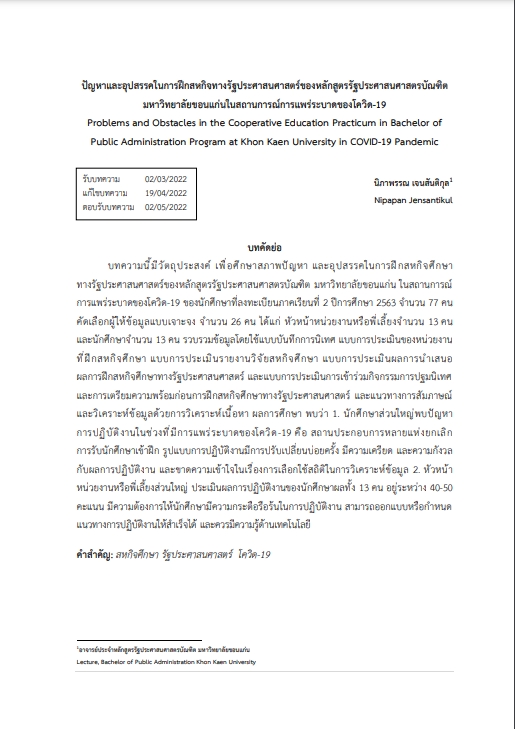Problems and Obstacles in the Cooperative Education Practicum in Bachelor of Public Administration Program at Khon Kaen University in COVID-19 Pandemic
Keywords:
Co-operative Education, Public Administration, COVID-19Abstract
This article aims to study the problems and obstacles in cooperative educationpracticum in the Bachelor of Public Administration Program at Khon Kaen University in the COVID-19 pandemic of students, enrolling in the second semester of the academic year 2020, consisting of 77 students. Of those, 26 people were selected as purposive sampling namely 13 heads of departments or mentors, and 13 students. Data were collected by The supervision record form, an assessment form for cooperative education agencies, an assessment form for cooperative education research reports, an evaluation form for the presentation of the results of cooperative education training in public administration, and an assessment form for participation in orientation activities and preparation prior to cooperative education training in public administration, as well as interview guidelines, All data were analyzed by using the content analysis. The results of the study revealed that: 1. The majority of the students faced with operational problems during the COVID-19 pandemic due to many establishments cancellation of student internship. The operating style has shifted frequently. There was the anxiety and stress about working performance and lack of understanding of the use of statistics for data analysis. 2. Most department heads' or mentors' assessments of the suggested that student trainees should be more enthusiastic at work and performance 13 Students’ trainees’ working ranked between 40 and 50 points. They suggested that student trainees should be more enthusiastic at work and should be able to design or define operational guidelines for their work achievement and should have technological knowledge.
References
กรรณิการ์ แสนสุภา และคณะ. (2563). การปรับตัวของนักศึกษาในสถานการณ์โควิด-19. วารสาร มจร มนุษยศาสตร์ปริทรรศน์, 6 (2), 83-97.
จรินทร์โพธิไชยะ. (2564). ความเห็นของผู้ประกอบการที่มีต่อการประเมินประสิทธิภาพการฝึกงานของนักศึกษาคณะวิทยาศาสตร์ สถาบันเทคโนโลยีพระจอมเกล้าเจ้าคุณทหารลาดกระบัง. วารสารวิทยาศาสตร์ลาดกระบัง, 30 (1), 1-12.
จุฑามาศ พรรณสมัย และคณะ. (2560). ประสิทธิภาพการฝึกงานของนักศึกษาสาขาวิชารัฐประศาสนศาสตร์ตามกรอบมาตรฐานคุณวุฒิแห่งชาติระดับอุดมศึกษา คณะมนุษยศาสตร์และสังคมศาสตร์ มหาวิทยาลัยราชภัฏเทพสตรี. วารสารวิชาการ คณะมนุษยศาสตร์และสังคมศาสตร์, 8 (2), 13-29.
ชลจิต วรวังโส วีรกุล และคณะ. (2564). แนวทางการปรับโครงสร้างตลาดแรงงานเพื่อขับเคลื่อนเศรษฐกิจไทย. กรุงเทพฯ: ธนาคารแห่งประเทศไทย.
ญาณีรัตน์ หาญประเสริฐ. (2555). การจัดการสหกิจศึกษาโดยโครงงานเป็นฐานเพื่อส่งเสริมความรับผิดชอบต่อสังคม. วารสารการอาชีวะและเทคนิคศึกษา, 2 (3), 44-52.
นเรนทร์ฤทธิ์ ไตรภูมิพิทักษ์. (2564). ประสิทธิภาพการปฏิบัติงานที่บ้านของบุคลากรสำนักงานพัฒนา
สังคมและความมั่นคงของมนุษย์จังหวัดเลย. วารสารมนุษยศาสตร์และสังคมศาสตร์ มมร. วิทยาเขตอีสาน, 2 (3), 23-29.
พรชนิตว์ลีนาราช. (2560). ทักษะการรู้ดิจิทัลเพื่อพัฒนาคุณภาพการเรียนรู้. วารสารห้องสมุด, 61 (2), 76-92.
พัชริทร์ เชื้อภักดี, รัชนีวรรณ ตั้งภักดี และบุญชู บุญลิขิตศิริ. (2560). การพัฒนารูปแบบการนิเทศในงานสหกิจศึกษาด้วยเทคโนโลยีสารสนเทศของคณะสถาปัตยกรรมศาสตร์ในสถาบันอุดมศึกษา. วารสารบัณฑิตศึกษา มหาวิทยาลัยราชภัฏวไลยอลงกรณ์ ในพระบรมราชูปถัมภ์, 11 (3), 132-142.
พาทิศ คงโสมา. (2555). สหกิจศึกษากับการพัฒนาคุณภาพบัณฑิตไทย. วารสารมหาวิทยาลัยนครพนม, 2 (3), 18-24.
มณีรัศมิ์ พัฒนสมบัติสุข. (2564). การตรวจสอบคุณภาพเครื่องมือวิจัยทางการพยาบาลและสังคมศาสตร์. วารสารเครือข่ายวิทยาลัยพยาบาลและการสาธารณสุขภาคใต้, 8 (2), 329-343.
มหาวิทยาลัยขอนแก่น, กองการต่างประเทศ. (2564). อธิการบดี มข. มอบนโยบายด้านการเรียนการสอนและการจัดกิจกรรมของนักศึกษา ในยุคสถานการณ์ COVID-19. ค้นเมื่อ ธันวาคม 16, 2564, จาก https://iad.kku.ac.th/news.php?id=714
มหาวิทยาลัยขอนแก่น, คณะมนุษยศาสตร์และสังคมศาสตร์. (2558). คู่มือสหกิจศึกษา สำหรับนักศึกษา อาจารย์ที่ปรึกษาและสถานประกอบการ. ขอนแก่น: คณะมนุษยศาสตร์และสังคมศาสตร์ มหาวิทยาลัยขอนแก่น.
ยาใจ พงษ์บริบูรณ์. (2555). การศึกษาแบบกรณีศึกษา: Case Study. วารสารศึกษาศาสตร์มหาวิทยาลัยขอนแก่น, 33 (4), 42-50.
สุจินดา ม่วงมี. (2549). บทบาทและความรับผิดชอบของอาจารย์นิเทศก์ตามการรับรู้ของนิสิตฝึกสอน อาจารย์พี่เลี้ยงและอาจารย์นิเทศก์. วารสารศึกษาศาสตร์, 17 (2), 31-46.
สุชน ยิ้มรัตนบวร. (2564). การศึกษาแนวทางพัฒนารูปแบบการจัดการสหกิจศึกษา กรณีศึกษาคณะสถาปัตยกรรมศาสตร์ มหาวิทยาลัยกรุงเทพ. วารสารสิ่งแวดล้อมสรรค์สร้างวินิจฉัย คณะสถาปัตยกรรมศาสตร์ มหาวิทยาลัยขอนแก่น, 20 (3), 29-45.
อภิญญา อิงอาจ, ณัฐพร กาญจนภูมิ และพรพรรณ เชยจิตร. (2563). ความกังวลในสถานการณ์การแพร่ระบาดของโรคติดเชื้อไวรัสโคโรนา 2019 ของนักศึกษาระดับปริญญาตรี. วารสารบริหารธุรกิจเทคโนโลยีมหานคร, 17 (2), 94-113.
อัศว์ศิริ ลาปีอี. (2560). ปัญหาและแนวทางการพัฒนาการดำเนินโครงการสหกิจศึกษาหลักสูตรรัฐประศาสนศาสตร์ คณะมนุษยศาสตร์และสังคมศาสตร์ มหาวิทยาลัยทักษิณ. วารสารสำนักหอสมุด มหาวิทยาลัยทักษิณ, 6, 217-247.
Estébanez, R. P. (2017). An approachment to cooperative learning in higher education: comparative study of teaching methods in engineering. EURASIA Journal of Mathematics Science and Technology Education, 13 (5), 1331-1340.
Haddara, M. & Skanes, H. (2007). A reflection on cooperative education: From experience to experiential learning. Asia-Pacific Journal of Cooperative Education, 8 (1), 67-76.
Jones, J. (2007). Connected learning in co-operative education. International Journal of Teaching and Learning in Higher Education, 19 (3), 263-273.
Stephen, B. (2008). Cooperative education: Supporting and guiding ongoing development. Journal of Cooperative Education and Internships, 41 (2), 37-44.
Thakral, P. (2017). Cooperative learning: An innovative strategy to classroom instruction. Learning Community, 8 (1), 17-22.

Downloads
Published
How to Cite
Issue
Section
License
Copyright (c) 2022 Journal of Humanities and Social Sciences Nakhon Pathom Rajabhat University

This work is licensed under a Creative Commons Attribution-NonCommercial-NoDerivatives 4.0 International License.
Journal of Humanities and Social Sciences Nakhon Pathom Rajabhat University





